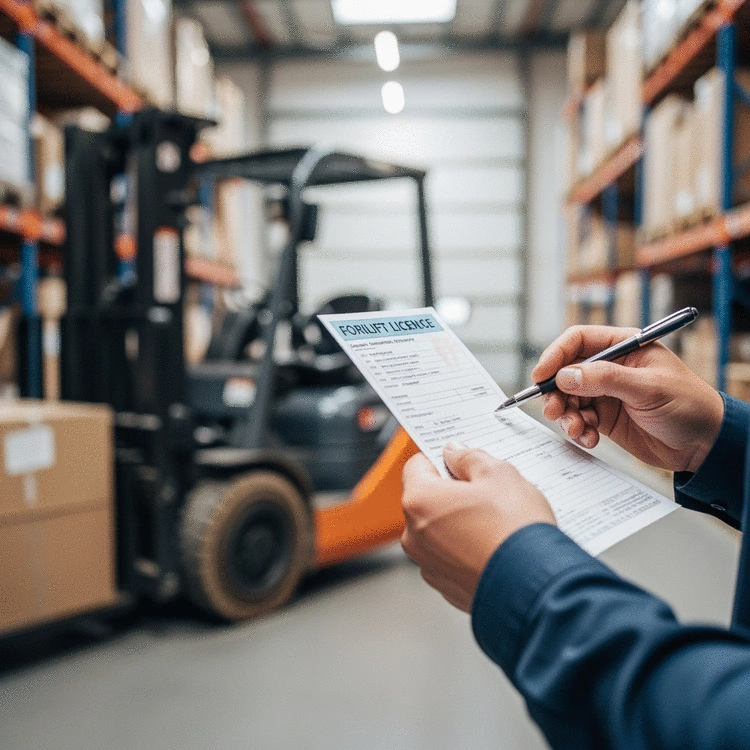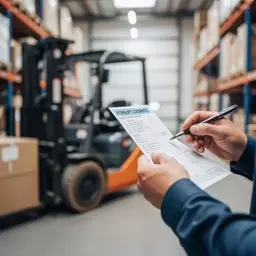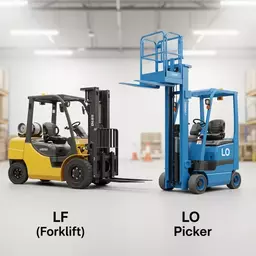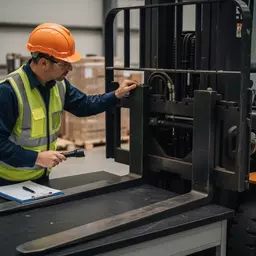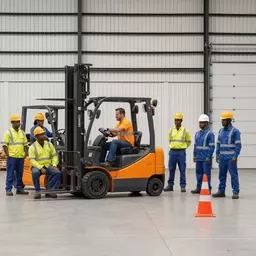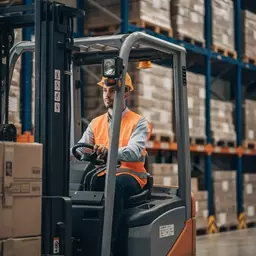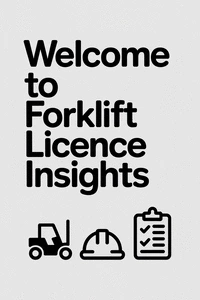In 2025, maintaining a verified forklift license is not just about legality—it's about ensuring safety and compliance in the workplace. As industries evolve, so do the standards for safe operation. Understanding the importance of forklift license verification can have a significant impact on your career and workplace safety.
What You Will Learn
- Verification of forklift licenses ensures compliance with legal and safety regulations.
- A verified license enhances employability and demonstrates professional commitment.
- Employers must provide adequate training and maintain detailed training records for compliance.
- Understanding ANSI standards is crucial for selecting effective training programs.
- Adhering to National Safety Council regulations promotes a culture of safety in the workplace.
Key Pillars of Forklift License Verification in 2025
Understanding the critical aspects and regulatory bodies involved in forklift license verification is essential for safety and compliance. For those looking to obtain their certification, understanding getting your forklift licence in Australia is a great first step. Here's a breakdown of the core components:
Why It Matters: Compliance & Safety
- Ensures regulatory compliance
- Reduces workplace accidents
- Boosts operator employability
OSHA Regulations for 2025
- Mandatory training & certification
- Employer evaluation of competency
- Detailed record keeping
ANSI's Role in Standards
- Develops framework for safe operation
- Guides training organizations
- Ensures comprehensive operator skills
NSC Safety Regulations
- Regular forklift inspections & maintenance
- Safe operating procedures
- Culture of safety promotion
Understanding Forklift License Verification in 2025
As we move into 2025, understanding forklift license verification is crucial for maintaining safety and compliance in the workplace. Verifying your forklift license not only ensures that you are legally certified but also reinforces safety standards that protect both operators and those around them. When you verify your license, you confirm that you have met the necessary training requirements, equipping you with the skills needed to operate forklifts safely.
In today's fast-paced work environment, compliance with safety regulations is not just a legal obligation; it's a fundamental aspect of operational success. So, let's dive deeper into why forklift license verification really matters!

Why Forklift License Verification Matters
- Ensures Compliance: Verification assures employers and regulatory bodies that operators have completed the required training.
- Promotes Safety: It helps maintain safety standards, reducing the risk of accidents in the workplace.
- Boosts Employability: A verified license can enhance job prospects within the industry.
By regularly verifying your license, you demonstrate a commitment to safety and professionalism. This proactive approach not only enhances your skills but also contributes to a safer workplace environment. So, don’t overlook the importance of this crucial step!
Key OSHA Regulations for Forklift Certification in 2025
The Occupational Safety and Health Administration (OSHA) sets forth critical regulations that affect both forklift operators and employers. Understanding these regulations is essential for anyone working in the industry. For instance, OSHA mandates that all operators be trained and certified to operate forklifts safely, and they must complete this training through a recognized training organization.
Employers also have specific responsibilities under OSHA regulations, including:
- Providing adequate training and resources for employees.
- Ensuring that operators are evaluated on their competency before they operate a forklift.
- Keeping detailed records of training and certification.
As we approach 2025, staying informed about these regulations is vital for maintaining compliance and ensuring employee safety. Ignoring these guidelines can lead to penalties and, more importantly, unsafe work environments. For further details on compliance, explore navigating forklift licence compliance laws.
The Role of ANSI in Forklift Certification Standards
The American National Standards Institute (ANSI) plays a pivotal role in shaping forklift certification standards. ANSI develops and publishes standards that establish a framework for safe forklift operation and training. These standards are essential in guiding training organizations and ensuring that operators receive comprehensive and effective training.
Forklift training programs that align with ANSI standards are more likely to provide operators with the necessary skills to handle various situations confidently. It’s essential for both operators and employers to be aware of ANSI's influence on certification processes. This understanding can help you choose the right training program that meets industry standards.
Forklift Safety Regulations from the National Safety Council
The National Safety Council (NSC) provides a wealth of information and guidelines aimed at promoting safety among forklift operators. Their safety regulations emphasize the importance of proper training, ongoing education, and adherence to safety protocols. As someone passionate about forklift safety, I highly recommend familiarizing yourself with these regulations.
Key safety regulations from the NSC include:
- Regular safety inspections and maintenance of forklifts.
- Establishing safe operating procedures and protocols.
- Encouraging a culture of safety among all employees.
Adhering to NSC guidelines not only helps protect operators but also enhances overall workplace safety, making it a win-win for everyone involved!
Interactive Poll: Your Thoughts on Forklift Safety
How confident are you in your knowledge of forklift license verification and safety regulations? Share your thoughts by selecting an option below:
FAQs about Forklift License Verification in 2025
Summarizing Your Forklift License Verification Journey
As we wrap up our discussion on forklift license verification, it's essential to highlight a few key points. Understanding the verification process is crucial for both compliance and safety in the workplace. Not only do you need to ensure your license is current, but it also reflects your commitment to operating forklifts safely. This journey involves making sure you are aware of the regulations, the verification steps, and the importance of staying updated.
Additionally, it's important to remember that keeping your forklift records accurate is not just about meeting regulations; it also demonstrates your professionalism in the field. By prioritizing these aspects, you create a safe working environment for yourself and your colleagues. Remember, safety and compliance should always go hand-in-hand in our industry!
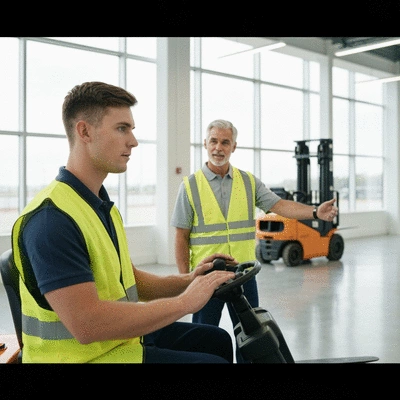
Next Steps for Forklift Operators and Employers
Now that you have a clear understanding of the verification process, what are your next steps? Whether you're a forklift operator or an employer, it’s time to take action! Start by verifying your forklift license through the official platforms we discussed. If you need to get certified or recertified, I encourage you to enroll in a training course soon. Taking this initiative not only enhances your skills but also ensures workplace safety, which is essential for everyone.
Don't wait until the last minute—being proactive about your certification can save you from potential penalties and ensure that you are always compliant with industry standards. Your future as a skilled and licensed operator starts with taking these next steps!
Resources for Ongoing Forklift Safety and Training
To support your continued education in forklift safety, there are numerous resources available to you. Here are some key organizations and websites that provide valuable information:
- National Safety Council (NSC) - Offers training materials and safety guidelines.
- Occupational Safety and Health Administration (OSHA) - Provides updates on regulations and compliance requirements.
- Forklift Certification Training Providers - Search for accredited training organizations near you. For those seeking professional development, consider exploring certified forklift training in Australia.
- Local Community Colleges - Many offer forklift training courses and workshops.
Utilizing these resources can help you stay informed and ensure that you are following the best practices in forklift operation. At Forklift Licence Insights, I’m dedicated to empowering you with the knowledge you need to succeed—don’t hesitate to reach out if you have any questions or need further guidance on your forklift licensing journey!
Recap of Key Points
Here is a quick recap of the important points discussed in the article:
- Importance of Verification: Forklift license verification ensures compliance with safety regulations and enhances safety in the workplace.
- OSHA Regulations: Familiarity with OSHA regulations is essential for operators and employers to maintain safety and compliance.
- ANSI Standards: Training programs aligned with ANSI standards provide operators with comprehensive skills for safe forklift operation.
- NSC Guidelines: Regular safety inspections and a culture of safety are crucial for preventing accidents and ensuring a safe working environment.
- Proactive Steps: Operators and employers should actively verify licenses and seek training to avoid penalties and enhance workplace safety.
